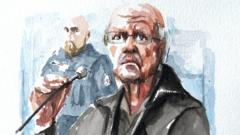As the trial of 74-year-old Joel Le Scouarnec nears its conclusion, many are awaiting the verdict with heavy hearts and renewed calls for institutional accountability regarding the tragic sexual abuse of minors. Le Scouarnec, who has confessed to sexually assaulting 299 victims—many while they were under anaesthesia—faces an additional sentence that could reach 20 years, on top of a previous 15-year punishment for similar charges. The trial has seen numerous victims recount their harrowing experiences, raising critical questions about how such abuse could persist for years without intervention.
Surgeon's Verdict Shines Light on Troubling Truths of Child Abuse in France

Surgeon's Verdict Shines Light on Troubling Truths of Child Abuse in France
A verdict is awaited in the case against Joel Le Scouarnec, a former surgeon implicated in the abuse of hundreds of minors.
The detailed accounts from victims in the courthouse have highlighted not only the individual pain inflicted by Le Scouarnec but also the systemic failures that allowed him to operate undisturbed for so long. His admissions of guilt and remorse in court haven't eased the distress or stirred public outcry as many believe accountability has yet to reach beyond Le Scouarnec himself.
The dissatisfaction among victims, advocates, and families represents a wider call for change within medical and legal systems in France, as discussions intensify on ensuring future protections for vulnerable populations.
Le Scouarnec has expressed regret during the trial but remains under scrutiny as victims seek justice not just for themselves, but also for future generations. This case serves as a stark reminder of the work still necessary to confront and dismantle silence surrounding child abuse in society.
As the world waits for the verdict, the focus remains on healing for the victims and accountability for a system that failed them for far too long.
The National Order of Doctors has acknowledged the failures, stating, "This situation has highlighted poor communication between the different entities of the Order of Doctors, and we deeply regret this." As a nation awaits the ruling, the overarching message is clear—change is crucial, for survivors and the systems meant to protect them.
The dissatisfaction among victims, advocates, and families represents a wider call for change within medical and legal systems in France, as discussions intensify on ensuring future protections for vulnerable populations.
Le Scouarnec has expressed regret during the trial but remains under scrutiny as victims seek justice not just for themselves, but also for future generations. This case serves as a stark reminder of the work still necessary to confront and dismantle silence surrounding child abuse in society.
As the world waits for the verdict, the focus remains on healing for the victims and accountability for a system that failed them for far too long.
The National Order of Doctors has acknowledged the failures, stating, "This situation has highlighted poor communication between the different entities of the Order of Doctors, and we deeply regret this." As a nation awaits the ruling, the overarching message is clear—change is crucial, for survivors and the systems meant to protect them.




















